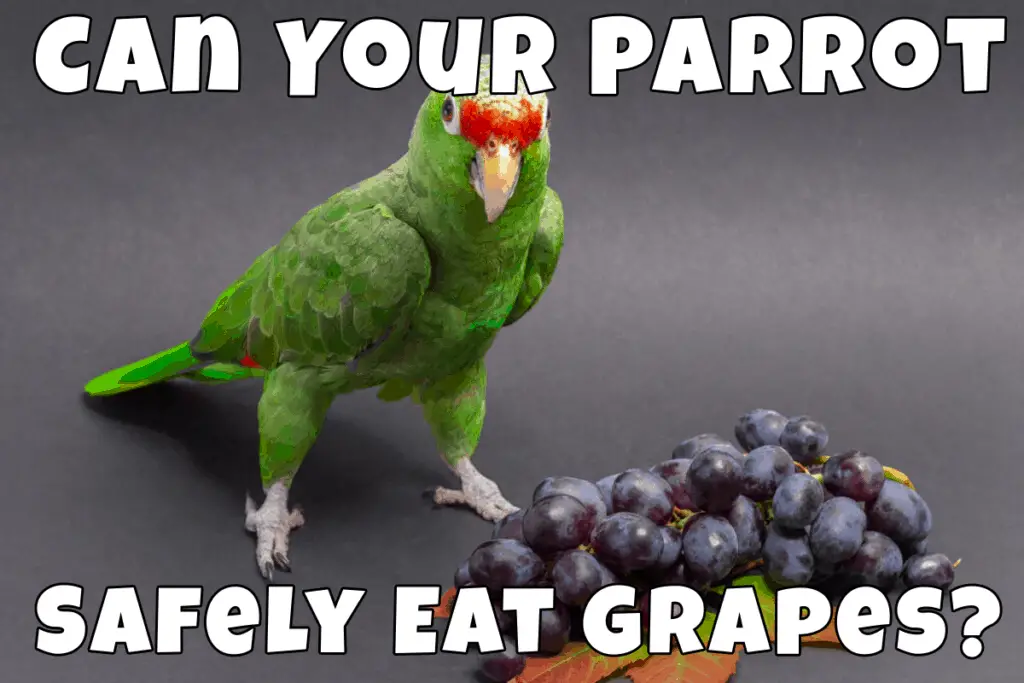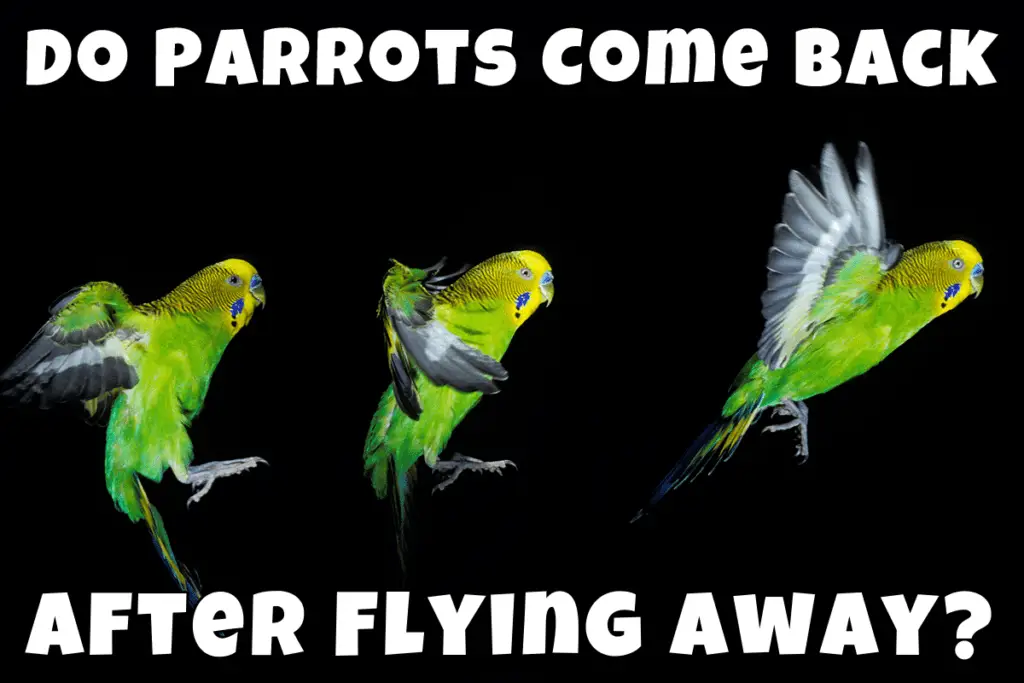Nuts and seeds are among the common foods parrots eat daily. They are the source of the essential nutrients for the birds. They are easy to access and come in the most varied forms. Unfortunately, some bring certain dangers to parrots.
One of the most common nuts we have at home are peanuts. Thus, many acquaintances who buy a bird ask me whether peanuts are safe for parrots. When trying to feed our little friends, it’s important not to harm them. Unfortunately, in certain cases, you may come with the best intentions and only make things worse. Thus, you need the help of parrot dieting articles.
Fortunately, that is not the case with these nuts. Peanuts are safe for parrots in small amounts. Moreover, they are essential for their diet! A fair share of nutrients that keep your bird healthy is contained in these snacks. If you buy only pure peanuts without the salty and artificial additives we like for our snacks, rest assured that no harm will come to the bird. In addition, you should also buy nuts of decent quality, do not rush to get cheap food as it may contain dangerous for parrots aflatoxin.
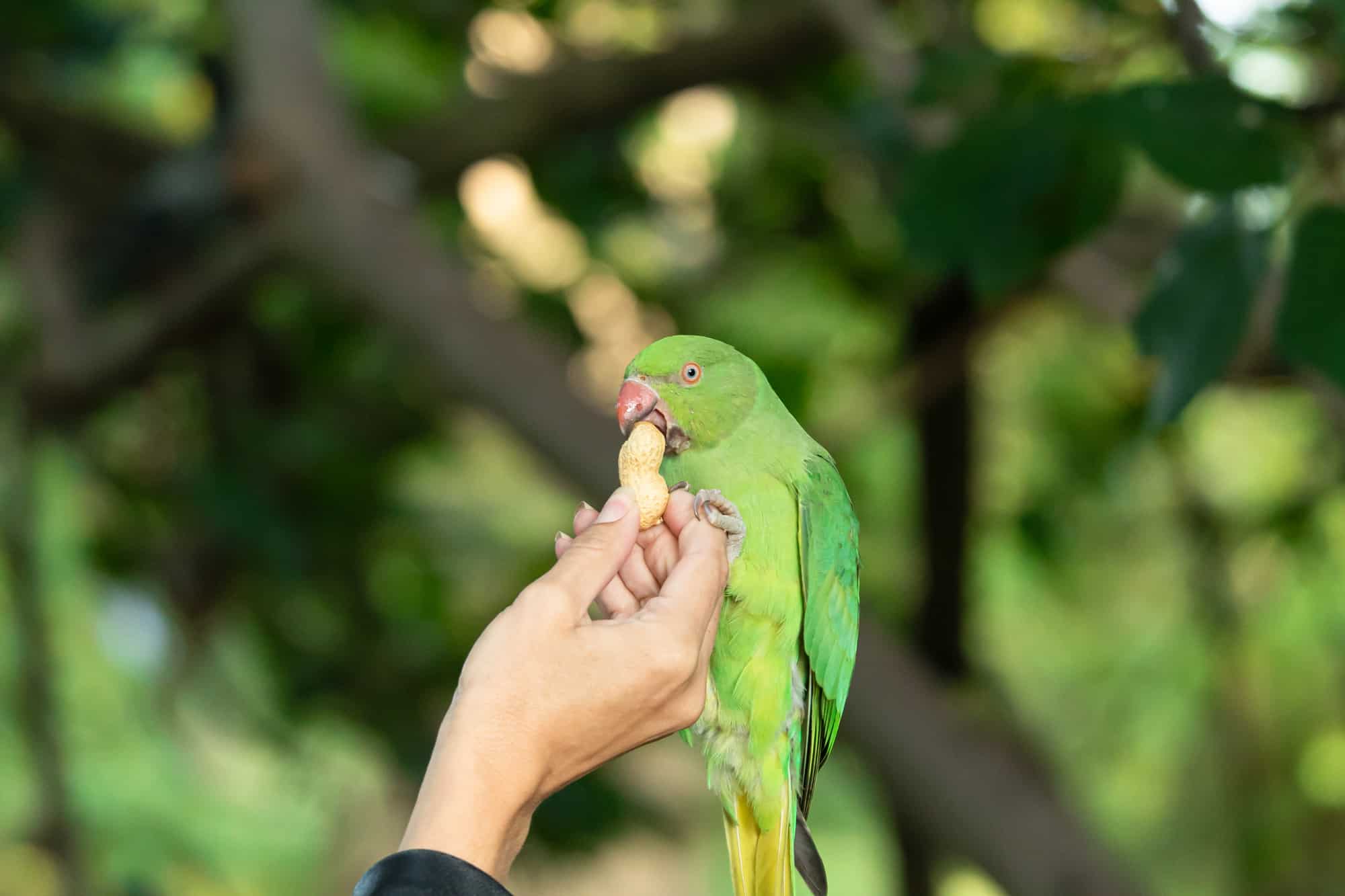
But do not worry, if you know how to choose good nuts, your bird can safely eat them. For this article, I’ve decided to devote my full attention to the rules of feeding your parrot peanuts. This is because they are the cheapest and most requested food for review!
Can Cockatiels Eat Cashews? Cockatiel Dinning Secrets
What Are the Health Benefits of Feeding Peanuts to Parrots?
As I’ve mentioned before, peanuts are an essential source of nutrients for birds. Moreover, this is their common food choice even in the wild. Thus, you should include them in the parrot’s diet.
Here are some peanut nutrients I’m talking about.
Protein
Of course, the main benefit of nuts is high-quality protein. Personally, I’m a fan of nuts for enriching my meals with protein. It is highly beneficial for people and parrots alike. Thus, if you have peanuts at home, feel free to feed them to parrots. The lack of protein may result in stunted growth, poor feature formation, liver issues, and so on. Though it is hard to consume too much protein for people, parrots require less, and most foods contain a certain amount of protein. Be careful when feeding the birds lots of nuts in one day.
Copper
To strengthen the bones of your bird, I suggest including copper-rich foods regularly. And peanuts offer a healthy dose of this element. In addition to bone health, copper works magic for the colorful and bright pigmentation of plumage. Connective tissues benefit from it as well.
Biotin
You’ve probably taken biotin supplements for healthy hair growth once or twice. Especially if you are a lady. We all have seasonal worries about hair loss, and biotin is an effective remedy.
Vitamin B7 is also useful for skin conditions for parrots, but the more important role concerns neurological health and heart disease prevention.
Vitamin E
This is yet another essential nutrient. With that in mind, it is less common than manganese in the ordinary products I discuss. But the lack of this element comes with horrendous results, among which are
- parakeratosis
- skeletal dystrophy
- diathesis
- brain softening
These are only a few examples of bird diseases that may accompany the lack of biotin.
Manganese
Speaking of manganese, it seems that I mention this element in many foods beneficial for parrots. It is contained in many products, but it also serves as an important component for the proper growth of the whole organism and muscle maintenance. I also usually suggest checking the daily intake of manganese for mated birds as it is important to keep the proper numbers of manganese for the reproductive system.
Can Eclectus Parrots Eat Walnuts Safely?
Phosphorus and Magnesium
These elements come in lesser numbers than the previous; that’s why I’ve combined them. Besides, their effects are somewhat similar for parrots. They both take part in bone formation, boost metabolism, and support the heart. I’d say that these two components should accompany manganese in the importance for married couples. They can also serve as a foundation for healthy egg production and growth.
How Many Peanuts Can Parrots Eat?
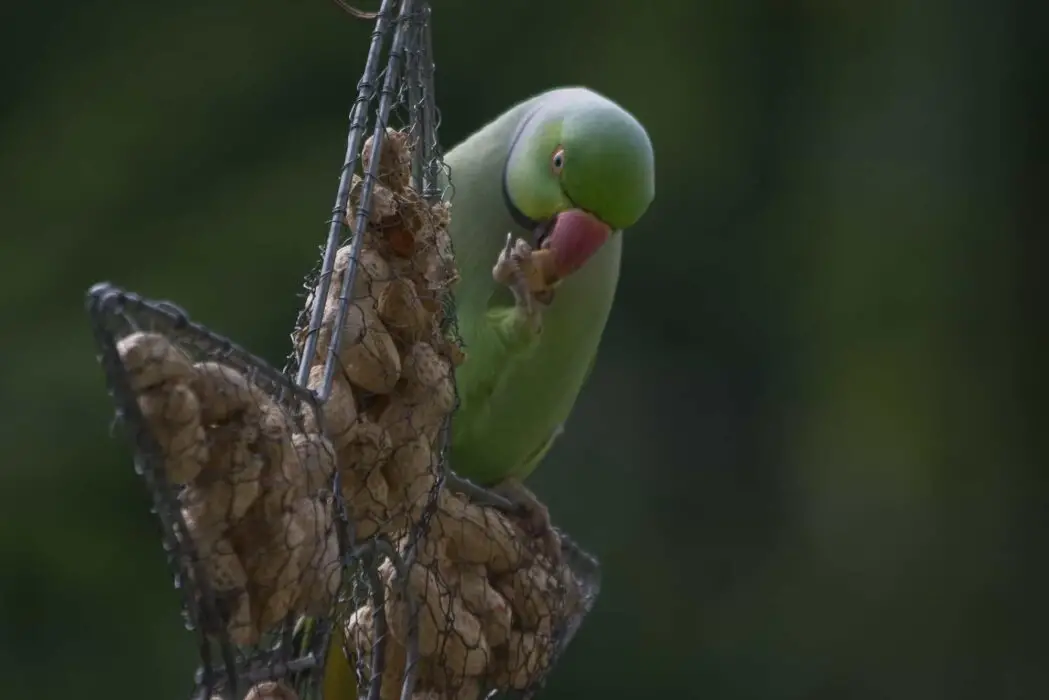
In general, if you are still worried even without the apparent traces of toxins, two nuts a day (on occasion, if you are super concerned) would be acceptable.
If you are sure about the quality of nuts, feel free to increase the number of nuts but only slightly to three or four if you don’t give them every day. Opt for roasted human-grade peanuts without additives.
Also, take notice of the peanuts contained in bird mixes. Peanuts are a common ingredient in them! You can either take these nuts away from the mix and exchange for the top-quality ones or only give this mix if you are sure of it. No additional snacks, then.
Can Parrots Eat Butternut Squash?
Can Parrots Eat Salted Peanuts?
As with pistachios that I’ve written about lately when discussing whether parrots can eat pistachios, salted nuts are not the best choice for parrots. Yes, birds should have salt in their diet, but the natural sources of sodium are enough for them. No store-bought salted peanuts for your pet! Leave these treats for your enjoyment.
Too much sodium can lead to a lot of issues (you can check the details in the pistachio article) and, even, to death in some instances.
What is Aflatoxin and How Is It Harmful to Parrots?
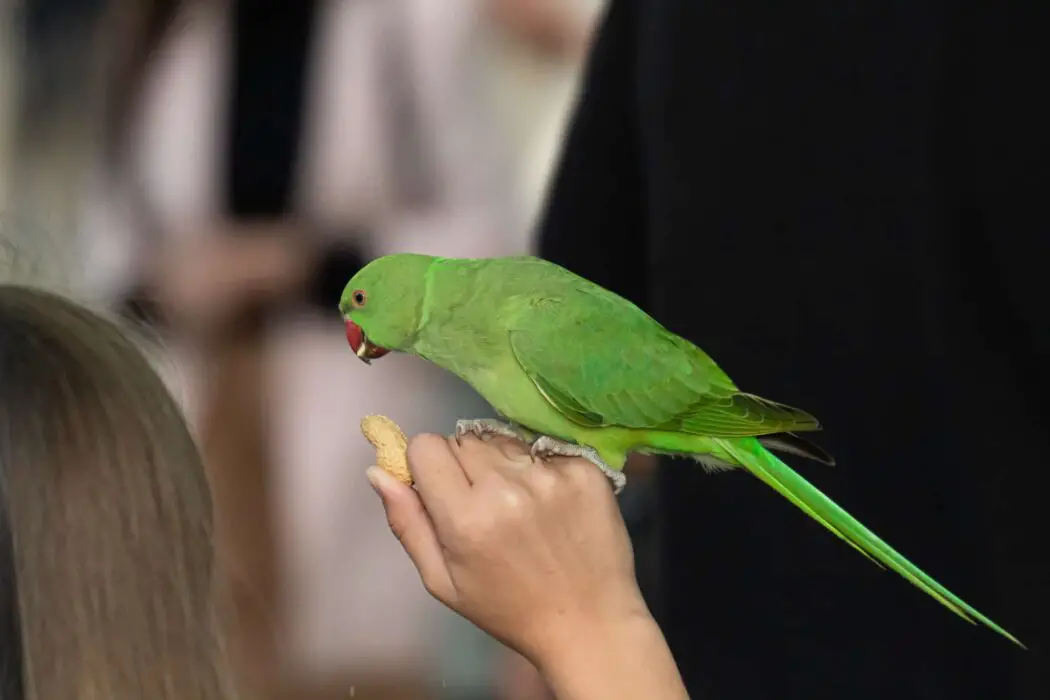
Do you remember that I mentioned at the beginning that you have to be careful with the quality of nuts due to the harmful effects of aflatoxin? Let’s discuss the negative influences and how to prevent them!
But, first of all, you should learn its nature.
Aflatoxin is not one but a group of toxins found in cereals, some grains, and peanuts in our case. They are produced by Aspergillus fungus. You’ve probably already guessed that this is a type of mold. And mold is never good for living organisms (well, there ARE some exceptions).
Naturally, peanuts do not have the harmful growth of this type of mold on them. Only poor storage can trigger growth. Thus, you should know never to buy and never to store yourself peanuts in damp, warm, and cold places. Do not buy peanuts at shade places at a whopping discount if you doubt storage conditions. Also, check the nuts for any signs of mold yourself.
If you are not careful and feed your parrot moldy peanuts, you endanger them with powerful toxic effects on their liver! And parrots are very weak in this area. Such exposure may result in liver cancer! So be careful and look out for the following symptoms.
- weight loss
- diarrhea
- itchiness
- nasal issues
- seizures
- nervousness
- self-mutilation
- black spots on features
While most of these symptoms may be misleading and are common for many other parrot illnesses, black spots are a sure indicator that you have to ask a vet about aflatoxins and the sus peanuts you’ve been feeding it! Anyway, even a couple of these symptoms require medication attention. It’s always better to call a vet for nothing than to wait for severe consequences.
How to Buy High-Quality Peanuts?
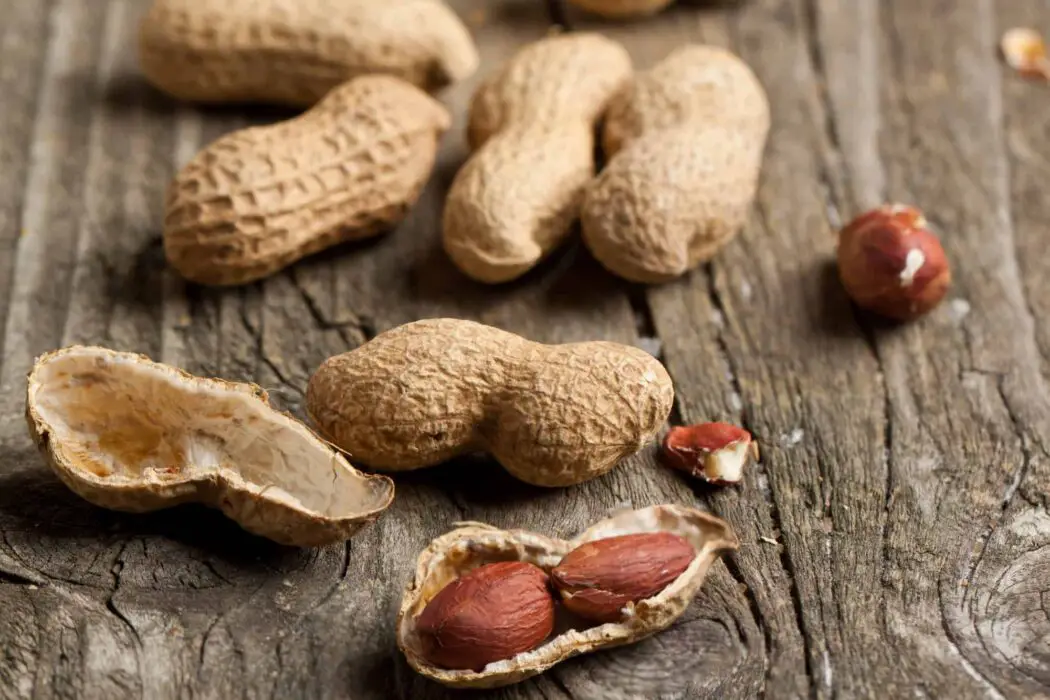
All these aflatoxins sound scary, right? That is why you need to learn how to choose healthy nuts. It’s vital for your health as well, if you like this snack.
But how to be 100% sure?
- Choose a name brand. Big brands usually test their products for aflatoxin and other harmful elements before sending them to the store. I know that you may like buying foods in bulk, which is helpful for ecology, yes, but there is no guarantee of quality in that case. With that said, anything can happen to nuts after they’ve been tested. A local store may have awful storage conditions. Thus, it’s important to follow step number 2 as well.
- Unpack and look for signs of mold on peanuts. In general, the contaminated nuts are discolored, shriveled, and with black spots on them. The shells are contaminated as well. It’s also easier to spot mold on shells in the shops due to their noticeable size.
Moldy nuts are not safe either for you or for your parrot. And roasting them in the oven doesn’t make a big difference when it comes to mold.
And, please, always ALWAYS remove peanuts from their shells before giving them to the parrot.
Can Parrots Eat Chilies Safely?
Can Parrots Eat Peanut Shell?
In theory, they can and would love to get their food this way. However, the issue of aflatoxin prevents this bit of fun. As shells contain the most amount of this toxin, peeling it is the smartest choice. There are plenty of other nut shells that are completely safe for birds; let them have fun in safety.
Can Parrots Eat Peanut Butter?
Peanut butter may be your favorite kind of treat for tasty mornings. But can you actually give peanut butter to your parrot?
You can buy it in certain conditions. First of all, make sure that this is organic butter with no processed sugars or other preservatives. Secondly, highlight the importance of proper storage conditions for the butter, especially if it has no preservatives. Ask shopping assistants about the conditions, certification, and so on.
If you manage to find high-quality butter, give a pea-sized ball to the parrot several times a week, no more!
What Peanuts Are Better: Roasted or Raw?
When it comes to the question of buying roasted or raw peanuts, there is no definite answer as both are equal in terms of safety for your parrot. Roasting the peanuts doesn’t make them any worse in terms of nutrients as well as it doesn’t kill off the mold.
Thus, this question is generally resolved by your parrot. Which type does it like more? Check what kind is preferred by your bird and stick to it. You can mix and match at times roasted and raw to make meals more interesting.
As you see, overall, peanuts are harmless, but it’s only if they are stored right. Mold is dangerous on peanuts. Thus, you have to make sure that you buy clean nuts. At all times. Especially when it concerns your pets. When small amounts are safe for humans, they can be deadly for parrots.
Overall, it is recommended to feed parrots a limited amount of peanuts as they are high in calories and fats. Aside from toxins, weight gain comes as another precaution to peanuts!
Remember the motto that I repeat after my foods articles – moderation is the key.

